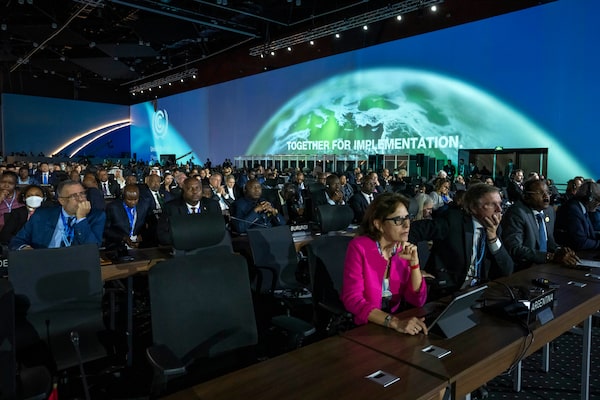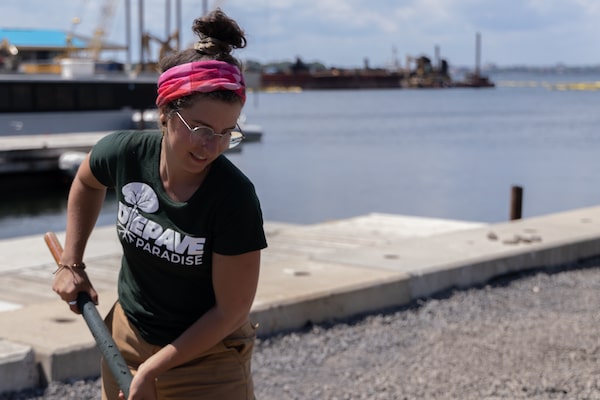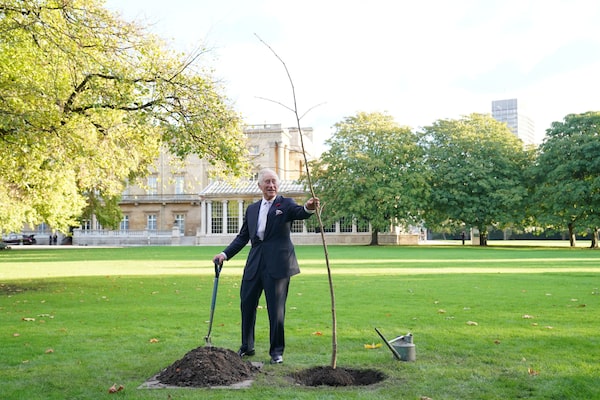If you’re reading this on the web or someone forwarded this e-mail newsletter to you, you can sign up for Globe Climate and all Globe newsletters here.
Good afternoon, and welcome to Globe Climate, a newsletter about climate change, environment and resources in Canada.
One year ago, it was COP26 in Glasgow and we were discussing in this newsletter whether it was a success or not. There was excitement, momentum, and some big agreements were made. This year feels different, but why do the vibes feel off?
If you need a hand getting caught up on COP27, check out this video about what topics to watch for, then make your way down to our deep dive section to get some explanation from The Globe’s climate editor about the climate summit this year.
Now, let’s catch you up on other news.
Noteworthy reporting this week:
- Agriculture: Idaho potatoes, hurt by smoky skies in wildfire season, give researchers clues to crops’ climate future
- Flooding: B.C.’s slow recovery leaves farmers worried about future threats.
- Explainer: Droughts create brutal challenges for hydroelectric utilities. Is Canada doomed to experience more of them?
- Policy: Ottawa announces green energy tax credits to keep up with U.S.
- Land: Ontario planning development of 50,000 new homes on protected Greenbelt land
- World: African drought zones have expanded 40 per cent since 1980s, triggering worst drought in decades, report says
- In-depth with The Narwhal: Can Bitcoin breathe new life into Alberta’s oil and gas?
A deeper dive
Welcome to COP27
Ryan MacDonald is senior editor of climate, environment and resources at The Globe. For this week’s deeper dive, he talks about our COP coverage this year.
A lot has changed in the world since COP26 in Glasgow a year ago. Russia’s war in Ukraine has triggered a global energy crisis, which in turn has contributed to a global food crisis. There is political and economic uncertainty around the world.
Heading into COP27 in Egypt, there is one thing that hasn’t changed: the need to act collectively, and with urgency, on climate.
It’s been said that this COP is unlikely to land a historic deal and has been labelled as a place for “implementation.” As world leaders gather this week, the vibes for COP27 are not good, The Globe’s climate columnist Adam Radwanski writes. He’s right.
What ultimately happens in Sharm el-Sheikh is not the be all and end all of climate diplomacy. There are other options for the kind of multilateral deals that need to be struck -- and there is increasing evidence of action, specifically on the energy front.
In Europe, countries trying to wean off Russian exports have accelerated action. The world’s largest oil-and-gas producer, the United States, is now spending US$370-billion on climate-related measures through the Inflation Reduction Act.
Back at home,The Globe’s Ann Hui reports on a push for Canada to develop a national approach to sustainable agriculture in the face of the deepening climate crisis. Agriculture is expected to be a big topic at COP27 and Canada can be part of the solution.
It’s true the world is falling short on the kind of commitments that this COP is meant to fix, such as climate finance and a loss and damages fund for vulnerable nations.
The Globe’s Eric Reguly will be in Egypt for the final round of negotiations. When we spoke last week, we talked about all the COP summits he’s covered over the years. It’s not lost on either of us that this is number 27 and the world is still talking about climate change and not doing enough.
The climate activist Greta Thunberg says these climate conferences “lack moral and political leadership.” COP is not redundant yet, but it may soon feel like these events belong to a different era.
- Ryan
Also read:
- Canadian delegation set to tell COP27 about oceans’ role in fighting climate change
- No time to COP out: World market themes for the week ahead

World leaders listen as their counterparts give speeches during the COP27 U.N. Climate Summit, in Sharm el-Sheikh, Egypt, Monday, Nov. 7,.Nariman El-Mofty/The Associated Press
What else you missed
- ‘Bubble barrier’ among finalists for Prince William’s Earthshot Prize
- Pristine alpine lake in Alberta contaminated by dust from mountaintop coal mines, study shows
- Some of the world’s biggest brands set to miss plastic sustainability targets, report says
- How homebuilders and residents are adapting to a warming world
- Activists glue themselves to Goya paintings in Spain climate protest
- EnPowered’s energy management systems are helping companies combat climate change – and reduce costs
- Nova Scotia team to restore historic Hector ship with trees downed by Fiona
- Price of carbon needs to average at least $75 a ton globally by 2030, IMF chief says
Opinion and analysis
Pamela Steer: Accountants are the key to accountable ESG investing
Adam Radwanski: Justin Trudeau, Doug Ford show improbable common purpose on building low-carbon industries
John Gorman: Clean energy is clean energy – so why does nuclear get such inconsistent government support?
Simon Donner and Kathryn Harrison: Despite calls for more Canadian energy, the sector is headed for long-term decline
Green Investing
Mark Carney says his green banking alliance will survive after dropping UN climate initiative requirement
A global alliance of financial institutions aiming for net-zero carbon emissions has relaxed its criteria for membership, but co-founder Mark Carney says this isn’t reason to worry. The group of banks, insurers and asset managers, known as the Glasgow Financial Alliance for Net Zero, or GFANZ, are now free to pursue their own decarbonization strategies.
The United Nations climate campaign remains a key source of guidance, but the change comes after U.S. and Canadian banks started to worry that lockstep divestment in energy sectors would expose them to antitrust enforcement.
- The Business Development Bank of Canada commits another $400-million for clean tech
- Opinion: Environmentalists and banks square off as new climate rules loom
- Oil investment lag sowing seeds for future energy crises, OPEC secretary-general says
Making waves
Each week The Globe will profile a Canadian making a difference. This week we’re highlighting the work of Emily Amon bringing more green space to urban landscapes.

Emily AmonSupplied
Hi, I’m Emily Amon, 26, and I lead a national community-level initiative called Depave Paradise.
People often feel powerless to make a difference when it comes to climate change. Our program enables local communities to identify grey “blandscapes”, a.k.a. urban areas with underutilized asphalt, and replace them with native-plant greenspaces co-designed by the community. The end result is a beautiful communal gathering space that gives people a sense of pride in their community and empowers advocacy for improved urban design.
This year I led the establishment of 15 new depaved sites in 13 communities across five provinces. I trained local co-ordinators, supported project development, and enabled cross community knowledge sharing. This year’s “depaves” involved over 1,600 volunteers working to increase equitable access to green space and improve local climate resilience. I attended six of these events in person to take part in the physical labour and fun. Together, our actions diverted 10,500m3 of stormwater runoff and approximately 1,669 kg of pollutants/year from local waterways.
- Emily
Do you know an engaged individual? Someone who represents the real engines pursuing change in the country? Email us at GlobeClimate@globeandmail.com to tell us about them.
Photo of the week

King Charles III plants a lime tree near the Tea House in the Buckingham Palace garden, for the Queen's Green Canopy, after hosting a reception for world leaders, business figures, environmentalists and NGOs, at Buckingham Palace on November 4, 2022, in London, England. King Charles III will miss the gathering of world figures in Egypt next week but is likely to discuss issues around Cop27 and climate change with those invited to his royal residence.Jonathan Brady/Getty Images
Guides and Explainers
- Want to learn to invest sustainably? We have a class for that: Green Investing 101 newsletter course for the climate-conscious investor. Not sure you need help? Take our quiz to challenge your knowledge.
- We've rounded up our reporters' content to help you learn about what a carbon tax is, what happened at COP 26, and just generally how Canada will change because of climate change.
- We have ways to make your travelling more sustainable and if you like to read, here are books to help the environmentalist in you grow, as well as a downloadable e-book of Micro Skills - Little Steps to Big Change.
Catch up on Globe Climate
- A postcard from Alberta’s Energy Transition Corridor road trip
- What Canada can learn from European energy planning
- Yukon River Chinook salmon decline is a cultural, spiritual loss
- The environmental cost of electrification
We want to hear from you. Email us: GlobeClimate@globeandmail.com. Do you know someone who needs this newsletter? Send them to our Newsletters page.